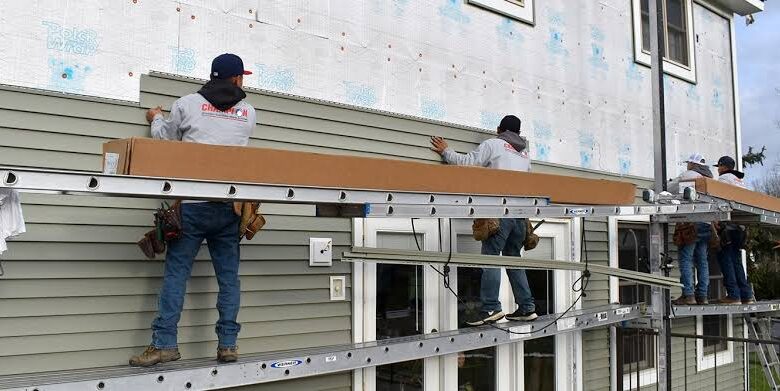Siding Installation: Essential Considerations and Techniques

Siding installation in Lanexa, VA, is critical to building construction and renovation, providing aesthetic appeal and essential protection against the elements. This process involves affixing a variety of materials to the exterior of a building to shield it from weather, improve insulation, and enhance its appearance. The choice of siding material, the substrate’s preparation, and the installation process’s accuracy all play pivotal roles in the longevity and effectiveness of the siding. We will discuss various facets of siding installation, from selecting appropriate materials to the techniques used to ensure a durable finish.
Various facets of siding installation
Choosing the Right Siding Material
Selecting the appropriate siding material is fundamental to the success of any siding project. Homeowners and contractors can choose from various materials, including vinyl, wood, fiber cement, and metal. Each material offers different levels of durability, maintenance needs, and aesthetic options. Vinyl siding, for example, is widely appreciated for its durability, affordability, and minimal maintenance requirements. Wood siding, on the other hand, offers a classic look but requires more upkeep to prevent issues like rot and insect damage. The selection process should consider the building’s architectural style, the area’s climate, and the homeowner’s maintenance preferences.
Preparing for Installation
Proper preparation of the walls before installing new siding is crucial for ensuring the material’s longevity and the building’s integrity. This stage typically involves removing old siding, repairing damaged sheathing, and ensuring the surface is clean and smooth. It is also important to install a water-resistant barrier to protect the structure from moisture penetration, which can lead to mold growth and structural damage. Correctly sealing joints and edges to prevent air leaks contributes significantly to the building’s energy efficiency. Attention to these preparatory details helps avoid costly repairs and replacements.
Installation Techniques for Different Siding Materials
The techniques used for installing siding can vary significantly depending on the type of material chosen. Vinyl siding, for instance, requires careful handling to allow for thermal expansion and contraction. It is typically hung loosely on the sheathing to enable this movement. Fiber cement siding, being heavier, demands more labor-intensive installation techniques and often specific tools to cut and affix the material securely. Each type of siding comes with its manufacturer recommendations and best practices, which must be meticulously followed to avoid compromising its performance and aesthetic quality.
Addressing Challenges in Siding Installation
Several challenges may arise during installation, including dealing with uneven surfaces, integrating siding with other building elements such as windows and doors, and managing the material in different weather conditions. Skilled installers must be adept at customizing pieces to fit irregular spaces and ensuring that every seam is properly aligned and sealed. Additionally, weather considerations such as wind, rain, and extreme temperatures can impact the installation process and the curing or settling of materials. Adequate planning and adapting to these challenges are essential for a successful installation.
Maintaining and Repairing Siding
Once installed, siding requires regular maintenance to retain its condition and functionality. The maintenance regimen varies by material; for example, wood siding may need periodic painting or staining, while vinyl siding requires only mild soap and water cleaning. Inspections should be conducted regularly to identify any signs of damage or wear, such as cracks, warping, or discoloration. Prompt repairs are necessary to prevent minor issues from escalating into major structural problems. Understanding the maintenance needs of the specific siding material can greatly extend its lifespan and maintain its appearance.
Environmental Impact and Sustainability in Siding Choices
Environmental considerations are increasingly influencing homeowners’ choices in siding materials. Many opt for materials that offer better energy efficiency and are made from sustainable or recyclable resources. For instance, fiber cement siding is favored for its longevity and potential for being made with recycled materials. Also, proper insulation techniques used with siding can significantly reduce heating and cooling costs, contributing to a building’s overall energy efficiency. Making environmentally conscious choices supports global sustainability efforts and often results in long-term financial savings for homeowners through reduced utility bills.
Ensuring a Successful Siding Installation
Siding installation is a complex process that visually and functionally enhances a building’s exterior. The success of a siding project hinges on several factors, including the choice of material, thorough preparation of the installation site, and meticulous application of correct installation techniques. Regular maintenance also plays a crucial role in preserving the siding’s integrity over time. By addressing each of these aspects with careful consideration and skill, homeowners and contractors can ensure that the siding looks appealing and performs its protective role effectively for years to come.



